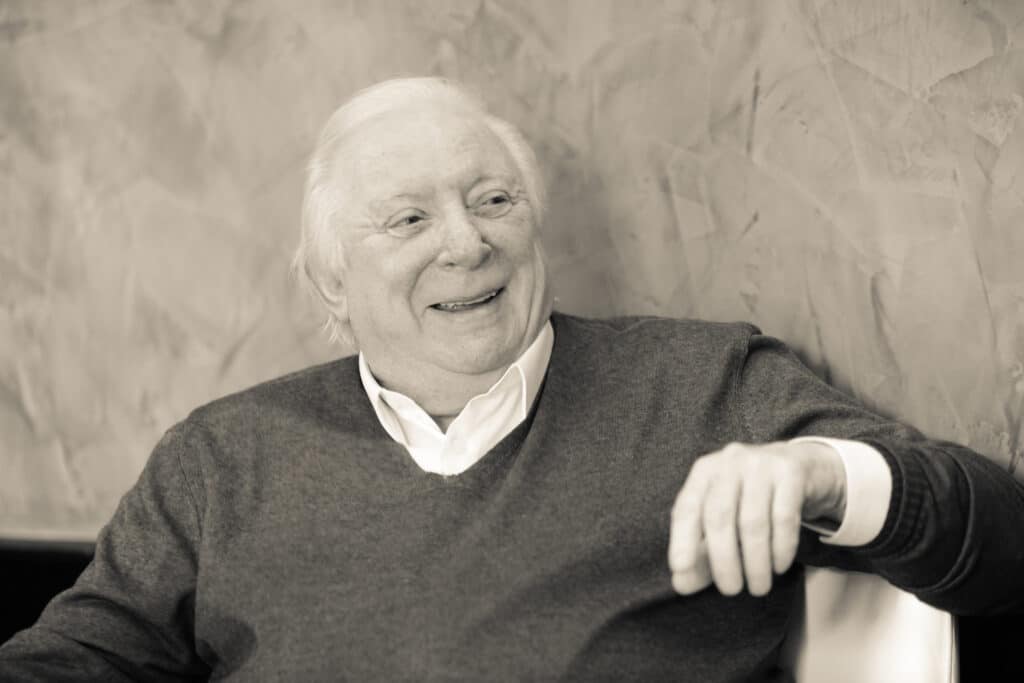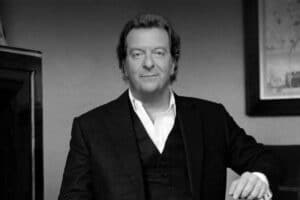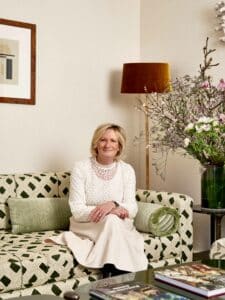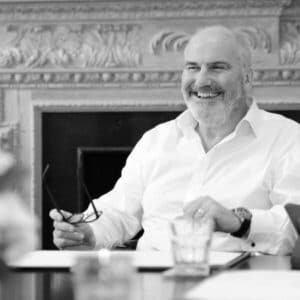 BBC News
BBC NewsBorrowing was £17.4bn last month, the second highest October figure since monthly records began in 1993.

Friends and family remember the great and charismatic investor and party maven Terence Cole who touched many lives.
Ronel Lehmann, CEO, Finito Education
I often find myself in and around Marble Arch for meetings and bow my head in respect to Terence Cole outside his Upper Berkeley Street office. It was there, thanks to Liz Brewer’s introduction, that we first met.
In 1976, Terence Cole founded MARCOL with Mark Steinberg, and together, they created a multi-billion-dollar international investment group. Terence was a true visionary and creative genius. He openly shared his politics and his utter disdain for Sadiq Khan, the Mayor of London, whom he despised for destroying the road infrastructure and transport network. Terence understood the importance of retail customers and championed Chelsea Harbour after acquiring it in 2003.
I remember our many conversations during the pandemic. He shared our passion for inspiring the next generation and loved our work helping young people find meaningful careers. He also adored this magazine and played a key role in improving our mentoring business strapline, “The Employability Experts,” for which we will always be grateful.
Before he passed away in December 2022, he told his staff to ensure his mobile phone was fully charged and buried with him, just in case he could make a call from the other side. Whenever I meet his colleagues, we always ask, “Have you heard from Terence?” He must have known that people would remember him with a smile.
He impacted many lives through his generosity of spirit and leaves an incredible legacy which his family continues, as patrons and benefactors, to many of the charities that he supported.
Mark Steinberg, co-founder and joint CEO, MARCOL

Terence and I worked together as partners for 46 years, from 1976 until he passed away. Despite the 25-year age difference between us, it never mattered. It just worked. Trust and faith in each other were the foundation of our relationship, which lasted longer than most marriages. When a business relationship lasts that long, you can finish each other’s sentences and know what your partner is thinking. In meetings, we naturally knew who should take the lead. Our roles were very merged. I handled more of the financial side, including fundraising and debt-raising, but we worked closely together on strategy.
In 1976, we secured a ten-year lease on a property just a stone’s throw from the offices we still have today. The lease cost £10,000 and marked the start of MARCOL. The name combined part of my first name and part of his second name. We began by working from his dining room table and then moved to a basement office without windows on South Audley Street. With the help of a part-time secretary, we built the business from the ground up, starting with The Portman Estate. We had no capital, but our tenacity kept us going. Soon, we were working with other estates like Cadogan, Eton College, and Grosvenor.
Over the next 40-plus years, MARCOL grew from nothing into a substantial pan-European operation. It evolved from a small residential real estate developer into a commercial enterprise as well. Eventually, it expanded beyond London to the rest of the UK and into Europe, with investments in Germany, Poland, Romania, France, the Czech Republic, and Hungary. We also became involved in operational businesses with real estate foundations, such as hotels.
Terence was intensely private, but charismatic, a maverick, a lateral thinker. He had very strong views about how he saw things. He had very leftfield views that really added a lot of gravy and sauce to what might otherwise would have been quite straightforward. There was nothing linear about him. You’d go into a meeting with him with other people and he would come from a complete tangent, and confuse them to begin with – but by the end of it they had bought into the idea.
Terence engendered very strong loyalty from people working with him from his staff. One of his PAs worked for him for 60 years. She also passed away last year but she worked for him way before we were together in a previous life and then left him for a few years and then she came back again. He created this very professional business but which had a family kind of atmosphere. Whether it was dealing with people’s health issues or personal issues he would always be the first to say: “We are going to send them away on holiday” or “We are going to pay their medical bills or whatever it might have been.”
Mentorship was very important to him. Terence was a very good judge of character: when we were interviewing people for roles or looking at businesses, he had a kind of sixth sense about people and was able to take a view on whether we should take somebody on or not.
Of course we had our ups and downs. We have been through numerous recessions: the late 70s property crash; the 1989 property crash; Lehman Brothers; Covid. He was a real personality – a bear of a man, who loved his food and loved people, loved to entertain, and loved to investigate something new.
Claire German, CEO, Design Centre Chelsea Harbour

It was almost as if he’d been here before. Since Terence died, it’s been strange not having him involved in my life. He played such a huge role ever since I arrived here 13 years ago – and I knew him before. He was a fabulous mix of an incredible business mind and great vision, able to predict what could happen. For example, during the pandemic, he said, “Darling, this is the easy bit, the pandemic. The hard part will be post-pandemic, with everyone trying to return to normal.” While others adjusted to lockdown, he was already thinking about getting people back into the office.
Terence had these intense business meetings where he would really put you through your paces. He would not suffer fools gladly: you had to know your stuff – bring in energy and have ideas. He had a twinkle in his eye; this made him quite mischievous. If a situation was getting out of hand, he would immediately see that and disarm it and then bring a lighter tone to it. He had great emotional intelligence.
Sometimes when Terence went off on a tangent, I would start off by thinking: ‘I’m not quite sure where this is going’. But you always had to believe in the journey because you knew the journey was a very well-thought-through one and you had to trust in that.
Every day at the Design Centre Chelsea Harbour, I can hear him in my ear. He would say: “We’ve got to stick to the concept”. He would drill that into me. The space would have to feel lively and create reasons for people to come. Right down to the food, the attention to detail was incredible. The Design Centre Chelsea Harbour is the jewel in MARCOL’s crown: they are very proud of what they achieved and rightly so and they had the vision to create this centre. It’s not just a landlord-tenant relationship: it’s bricks and mortar and beyond.
He was also the mastermind behind the parties. However, he wasn’t exactly easy-going about it. If something didn’t meet his standards, he would be highly critical. He often said that a party needed the right atmosphere and a heartbeat to truly succeed
It doesn’t quite seem real that he is not here. I keep expecting him to burst in at any moment asking for food. Food was always a big thing in the meetings. He would arrive; we would be in a meeting and he would always arrive after everyone else and say: “Darling, can you get me an egg sandwich?” I was learning at the feet of the master.
Nigel Lax, Director, MARCOL

I first met Terence Cole in 1994 when I was in my late 30s. By then, I had already gone through a fairly traditional career path. I had qualified as a chartered surveyor and spent 10 years working in private practice across various parts of the UK. Then I came down to London to work for a developer in the late 80s. This was an inauspicious time to come to London: the developer I worked with was going down the tubes like a lot of developers at the time. I had a respite at the Halifax Building Society again very traditional financial institution – and then I met Terence.
He walked into my office on the Strand, always larger-than-life and brimming with confidence. He said, “I believe you have an asset in Docklands that you’re trying to sell for the Halifax. ”I would like to buy it.” We weren’t even marketing it at the time. Cutting a very long story short we negotiated a sale of this asset over a period of no more than probably 3 or 4 weeks. I didn’t know MARCOL from a hole in the wall. It was before the internet so you couldn’t check anybody out. There then ensued a long torturous negotiation with Terence in the Churchill Hotel where he would turn up two hours later than scheduled.
After that, he made me a job offer. I realized I didn’t want to spend the rest of my life at the Halifax. Thirty years later, I’m still working for the Cole family office and Mark’s family office – it’s all gone by in a flash. Terence always pushed you beyond your comfort zone, outside the boundaries you were used to.
That’s the best thing you can do in your career: being tested all the time means you’re learning all the time. Now, in my late 60s, I’m still seeking new intellectual stimulation. I’ve also developed other interests that I don’t think I would’ve pursued if not for Terence. He had a mind-expanding approach to everything.
Terence Cole was an exceptional litigator who thrived on challenges. If he sensed someone was trying to deceive him, he’d be relentless. I recall a long lawsuit against a firm of valuers. After two and a half years, we were close to a settlement with their insurers. On Friday, we had a reasonable offer, but Terence wasn’t satisfied. Without taking notes, he stood up and walked out, saying, “When you see sense, come back.” Over the weekend, he managed to increase the offer by another 10%. When he called me on Tuesday, I told him I would’ve accepted the Friday number, but clearly, he’d done a much better job. He simply replied, “I’m only doing it for you.”
He also had an extraordinary attention to detail. My wife worked with him on one of his refurbishments, which was hugely frustrating for her, but she learned a lot. Specifically, don’t settle for second best when you know something can be done better – especially if you’re paying for it. Criticize it. My wife is much like him now. We’re doing a project up in Yorkshire, and at first, the contractors found it frustrating, but if they understand it, they can really raise their game.
Parties were Terence Cole’s hobby – that’s what he lived for. The Coles always threw a party on Boxing Day. One year, they took a suite at the Savoy, but when we arrived at the scheduled time, we were held in the lobby because the room wasn’t ready. We then found out that, just 30 minutes before the party was to start, Terence decided he didn’t like the room layout. He had them take the doors off the hinges to make the space flow better.
It was never dull. MARCOL isn’t the same without him. The younger staff will never experience that. With Terence, there were no airs and graces – no aloofness. He wanted people to look after and respect him, but at the same time, he gave that respect and care back.
Victoria Boxall-Hunt, Group Operations Director, MARCOL

I shall never forget the first day I met Terence Cole. He made me laugh so much in my interview that I snorted! It makes me go red at the thought even now – 18 years later. On my second interview, he sent his car and driver to collect me and bring me to Upper Berkeley Street to meet him and Mark. This was no ‘normal’ company and so began my journey with MARCOL, a journey that has shaped my life and given me many experiences that I would never have had. It has taught me a huge amount, introduced me to some incredible people and has tested and delighted in equal measure. There is also no doubt that we have laughed a lot and had a lot of fun over the years.
I genuinely think they broke the mould when they made Terence Cole. He didn’t do things people expected; in fact, he did quite the opposite. I learned a lot from him, especially to be patient, stay quiet, listen intently, and stand up for myself and fight my corner. He had an innate understanding of people and a unique way of asking questions and getting things done that astounded me. What seemed utterly preposterous at the start of a meeting would somehow seem totally doable by the end. He had an uncanny ability to persuade people, often making them believe the idea was theirs all along. Deeply involved in planning my wedding, he took a genuine interest in every detail. For example, he insisted I use his car and driver to go to the church, while he would take a taxi.
I’ve witnessed so many unbelievably kind and thoughtful gestures over the years that genuinely made a positive impact on people’s lives. He was driven by making a difference and leaving an impact, which he did. I think of him often and regularly ask myself, “What would TC have done?”
Niki Cole, Terence Cole’s wife
I was married to Terence Cole for 48 years. When I met him, I was a young actress who had just finished a movie in LA. I was doing publicity and had been asked to visit a fabulous European men’s shop to sign autographs. I saw a big limousine pull up outside, and Terence stepped out with two men. He looked around and quickly started trying on clothes. At the end, he said, “I’ll take all these clothes on the condition that that lady over there delivers them to the Beverly Hills Hotel.”
When I heard this proposal, I said, “I’m not doing that.” But Terence had this power and presence. I went with the driver to deliver the clothes, and when I arrived, I was invited in for a drink. I stayed with him for a week, at which point he said, “If you play your cards right, I’m willing to marry you.”
Terence knew it all – he never lacked confidence in any situation. He was relaxed, grounded people, and drew them in.
I’ll never forget the Hollywood glamour-themed party Terence threw for my son Alex and his wife after their wedding. Held outside London with 500 guests, each had their own chauffeur and car. The party lasted until 5am, with rooms themed to different eras and music ranging from the Royal Opera to the Black-Eyed Peas. My son and his wife had no idea. There was a Doctor Zhivago room with ice sculptures and Russian soldiers, another for period films with women in Jane Austen-style costumes, and a surprise reveal with Alex and his wife on stage. Jools Holland and José Carreras performed, and breakfast was served at 5am.
It could be daunting sometimes. If I said, “I’m not doing this,” he’d reply, “We are doing this – I know what’s right.” The secret to staying married to him was learning how to challenge him back.
When he died in London at the Cleveland Clinic, I wanted him buried in America. It’s a beautiful place, with the sea on one side and mountains on the other. He is buried in his tuxedo jacket, a pink open-neck silk shirt, white trousers, and green velvet carpet slippers. My husband danced to his own tune in life.
Alex Cole, Terence Cole’s son, founder of Elevate Entertainment
My father was a man who created his own destiny: it was his way or the high way. He was a man who’d built something from the ground up in business, and didn’t apologise for it. Why should he? He could humble any mighty person – no matter how powerful you were, he could always teach you something. He had this way of speaking in a low voice, of taming people, and drawing people into his wisdom. I knew if I went into property development and private investment, I would never get close to what he was doing: I didn’t want to interfere with the master. My path in life was a little to his chagrin: “There’s no money in that,” he’d say.
So I now produce and develop big TV shows: that’s very different to what my father did. There were things we each had to navigate in relation to each other’s choices. My father wanted me to always admire what he did, but I could never achieve what he had done in business, even though he would have liked that. For me, it would have been disrespectful to step into those shoes.
I was going to stand on my own two feet. While he was around you knew everything was going to be fine; he was going to see to that. He needed to control the family – and not in a bad way. I felt secure in my family; you knew you could always go to this wise man for help, whether it to be personal or to do with business. If you were under his watch, you were taken care of.
When he went we all felt lost: me, my mum, Mark. Because my sister had health challenges, I had pressure to keep the legacy of the Cole name going. That created a wonderful bond, but it also created a pressure. When my dad passed away I wanted to keep that security nearby, and have him close to me: I arranged to have him buried about 15 minutes away. He liked the sunshine of America: he liked getting out of England – he found the mentality to be: “You can’t do that”. My father would always say: “Well, I’m doing it anyway.”
As my career progressed, Terence Cole developed an interest in films. He wanted to teach me how to produce them and suggested I host a talk show. He was proud of the creative nature of the job, dealing with celebrities, and considered it more glamorous than property—at least, until you experience it firsthand. He’d quietly say, “I’m proud of you, right?” His compliments were always meaningful, unlike the constant praise from others.
As for the parties, I’ve attended the Oscars, but they were dull compared to what my father could create. He’d plan everything but never seek the spotlight. His enjoyment came from watching people experience the party as they moved through it.
When it came to work, he never had to behave in a certain way: he was the meeting. Everyone had to pause while he did his things. But the theatrics encouraged people to want to do business with him; he wasn’t conventional. And he loved everyone: the team, the staff, the doorman. If you were part of his group, you were part of his group. It created company morale. He didn’t waste his life in any way. When he died he was 90 years’ old. His mind was strong, that mind could have gone on to 105 in the office. But his body gave up on him which makes the loss of my dad harder to stomach.